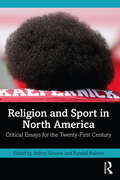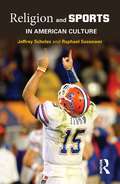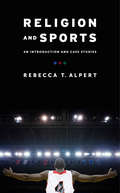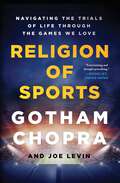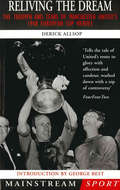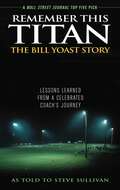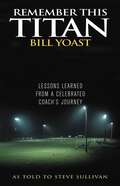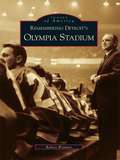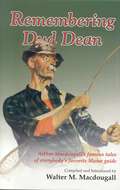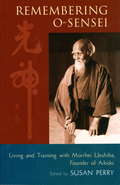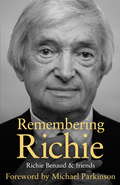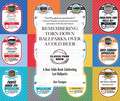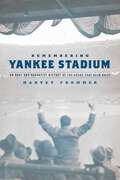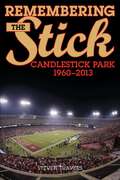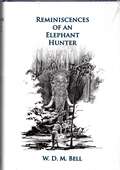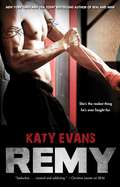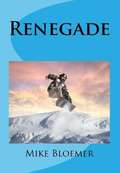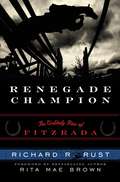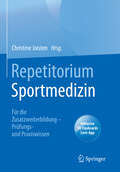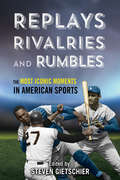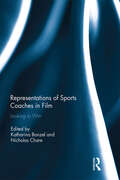- Table View
- List View
Relief Pitcher
by R. G. EmeryBaseball story about a rookie with confidence and pressure problems. He learns to deal with these and becomes a success.
Religion and Sport in North America: Critical Essays for the Twenty-First Century (A\ferris And Ferris Book Ser.)
by Randall Balmer Jeffrey ScholesFrom athletes praising God to pastors using sport metaphors in the pulpit, the association between sport and religion in North America is often considered incidental. Yet religion and sport have been tightly intertwined for millennia and continue to inform, shape, and critique one another. Moreover, sport, rather than being a solely secular activity, is one of the most important sites for debates over gender, race, capitalism, the media, and civil religion. Traditionally, scholarly writings on religion and sport have focused on the question of whether sport is a religion, using historical, philosophical, theological, and sociological insights to argue this matter. While these efforts sought to answer an important question, contemporary issues related to sports were neglected, such as globalization, commercialization, feminism, masculinity, critical race theory, and the ethics of doping. This volume contains lively, up-to-date essays from leading figures in the field to fill this scholarly gap. It treats religion as an indispensable prism through which to view sports, and vice versa. This book is ideal for students approaching the topic of religion and sport. It will also be of interest to scholars studying sociology of religion, sociology of sport, religion and race, religion and gender, religion and politics, and sport in general.
Religion and Sports in American Culture
by Raphael Sassower Jeffrey ScholesReligion and Sports in American Culture explores the relationship between religion and modern sports in America. Whether found in the religious purpose of ancient Olympic Games, in curses believed to plague the Chicago Cubs, or in the figure of Tim Tebow, religion and sports have been and are still tightly intertwined. While there is widespread suspicion that sports are slowly encroaching on the territory historically occupied by religion, Scholes and Sassower assert that sports are not replacing religion and that neither is sports a religion. Instead, the authors look at the relationship between sports and religion in America from a post-secular perspective that looks at both discourses as a part of the same cultural web. In this way each institution is able to maintain its own integrity, legitimacy, and unique expression of cultural values as they relate to each other. Utilizing important themes that intersect both religion and sports, Scholes and Sassower illuminate the complex and often publicly contentious relationship between the two. Appropriate for both classroom use and for the interested non-specialist, Religion and Sports in American Culture brings pilgrimage, sacrifice, relics, and redemption together in an unexpected cultural continuity.
Religion and Sports: An Introduction and Case Studies
by Rebecca AlpertLike religion, playing and watching sports is a deeply meaningful, celebratory ritual enjoyed by millions across the world. The first scholarly work designed for use in both religion and sports courses, this collection develops and then applies a theoretically grounded approach to studying sports engagement globally and its relationship to modern-day issues of violence, difference, social protest, and belonging.Case studies explore the place of sports in mainstream faiths, such as Judaism, Islam, Buddhism, and Christianity, and lesser-known religious groups, particularly in Africa. It covers football, baseball, and basketball but also archery, soccer, bullfighting, judo, and track. Essays reflect all skill levels, from amateur to professional, and find surprising affinities among practices and cultures in locations as disparate as Germany and Japan, Spain and Saudi Arabia. Thoroughly examining a range of phenomena, this collection fully captures the unique overlap of two universal institutions and their interplay with human society, politics, and culture.
Religion of Sports: Navigating the Trials of Life Through the Games We Love
by Gotham Chopra Joe LevinFrom the acclaimed director who has gone behind the scenes with many of the greatest athletes in the world, a memoir-meets-manifesto featuring never-before-heard stories about Tom Brady, Simone Biles, Kobe Bryant, Serena Williams, and many more. Sports is religion. No, really. From pilgrimages and cathedrals, gods and fallen angels, holy wars and holy ghosts, sports has every aspect of an organized faith. In fact, it might be even better: all it takes to believe is to stand and cheer. Nobody knows this better than the preeminent sports documentarian Gotham Chopra, who just so happens to be the son of world-renowned spiritualist Deepak Chopra. While his father taught him to find faith through prayer, Gotham felt pulled towards the Boston Garden and Larry Bird instead. Tracing his unique path from being a diehard fan to witnessing miracles alongside the gods of sport, Gotham makes a compelling case for sports as a modern-day faith. And like any worthy religious text, he also doles out wisdom, which comes in the form of never-before-heard stories about some of the biggest names in sports. Rarely has anyone had such an up-close view of greatness as Chopra, and now, he lets you come with him behind the scenes to learn how legendary quarterback Tom Brady managed the end of his career, gold medal gymnast Simone Biles struggled with the pressure of the Tokyo Olympics, Golden State Warriors sharpshooter Stephen Curry developed the greatest three-point shot of all time, and much more. Chopra weaves together stories from Kobe Bryant, Alex Morgan, LeBron James, Michael Strahan, Shaun White, and more into modern-day parables that unlock secrets of competition—and of life. Passionate and inspiring, the Religion of Sports is not just for diehard sports fans, but for anyone who&’s ever believed in something greater than themselves.
Reliving the Dream: The Triumph and Tears of Manchester United's 1968 European Cup Heroes
by Derick AllsopManchester United are one of the biggest football clubs in the world. Their fame has spread to the most remote corners on earth. The legend grew out of one man's obsession with taking his club to the pinnacle of the European game. Matt Busby was a visionary as well as an exceptional manager, and he defied the Establishment by leading his young English champions into Continental combat.That crusade was cruelly savaged in 1958 when eight of his players were killed in the Munich air crash. Busby survived and, amazingly, rebuilt a side - including the revered trinity of Charlton, Law and Best - which was good enough to win the League Championship twice and, just a decade after the tragedy, realise the dream in that mesmeric final against Benificia. England had its first champions of Europe.This book celebrates the glory of '68 in the company of the Wembley heroes and traces the club's decline and regeneration into a force aspiring to relive the ultimate dream.
Reloading for Handgunners
by Patrick SweeneyInReloading for Handgunners, the reader will learn the benefits of serious handgun ammunition reloading (decreased cost, increased reliability) in an accessible, step-by-step way. In addition, the reader will learn how to avoid the costly, wasteful errors that plague many reloaders, experienced and novice alike. Finally, the reader will enjoy the vast experience and unique style that have made Patrick Sweeney the country's leading guru on tactical and competition shooting and ammunition. Features: Shortcuts, hints and tips (from a certified master gunsmith, film consultant, and certified Armorer Instructor) to reload your own ammunition and avoid costly errors Loading data for the most popular and asked-about calibers Specialty loading info for: Competition: IPSC/IDPA, Bullseye, Steel Challenge, Cowboy Hunting: heavy magnums and big bores About the Author In addition to being Handguns Editor for America's largest general-circulation shooting magazine, Guns & Ammo, Patrick Sweeney is Gun Digest Books best-selling single author. His titles include:The Gun Digest Book of the 1911Vol. 1 & 2,The Gun Digest Book of the GlockVol. 1 & 2,The Gun Digest Book of the AR-15Vol. 1, 2 & 3,Gunsmithing: Rifles,Gunsmithing: Pistols & RevolversandGunsmithing the AR-15. Pat is also a certified master gunsmith, film consultant, and certified Armorer Instructor for many police departments nationwide. Patrick Sweeney lives in Ann Arbor, Michigan.
Reloading for Shotgunners
by Rick SappThe Classic Reference - Bigger and Better than EverOne of the most respected reloading texts of all time, Reloading for Shotgunners is now bigger, more comprehensive and more profusely illustrated than ever!This all-new fifth edition includes exhaustive data for lead and non-toxic shot - and it goes well beyond the ho-hum 2-3/4" 12-gauge data contained in other books. From .410 bored to 10-gauge magnum, from 2" hulls to the mammoth 3-1/2", if it can be fired in a shotgun, it's in this book!Rick Sapp, co-author of The Gun Digest Book of Trap & Skeet, has outdone himself in creating this masterful compilation of shotgun reloading data. Whether you're a novice shotgunner or a seasoned reloader, you can't afford to be without this ground-breaking fifth edition of Reloading for Shotgunners.
Remember This Titan: Lessons Learned from a Celebrated Coach's Journey As Told to Steve Sullivan
by Steve SullivanBill Yoast is the real-life hero of Remember the Titans, the hit movie that chronicled the struggles of black and white high school football athletes to create a championship season in 1972 Virginia. A World War II veteran, Yoast helped to mold the lives of hundreds of men and women through his inspirational coaching style. Yoast offers his personal recollections from that now-immortalized season as well as the coaching philosophy he developed in over 30 years of his career.
Remember This Titan: The Bill Yoast Story: Lessons Learned from a Celebrated Coach's Journey As Told to Steve Sullivan
by Steve SullivanBill Yoast is the real-life hero of Remember the Titans, the inspirational hit movie that chronicled the struggles of black and white high school football athletes to create a championship season in racially charged Alexandria, Virginia, in 1972. Will Patton played Yoast's role and Denzel Washington played the role of Head Coach Herman Boone. Uniting in a common effort, Yoast and Boone led T.C. Williams High School to an undefeated season, and in the process brought the school and polarized community together. The real-life Yoast is even more compelling than his film version. At one time, the former World War II veteran considered going into the ministry. Fortunately, for the hundreds of young men and women whose lives he helped mold, he found his calling in coaching. To him, the title "coach" always meant more than wins and losses; coaching was a vehicle through which he could help young people. One of Yoast's greatest victories came with Gerry Bertier, his star lineman whose tragic auto accident and resulting paralysis was seen in Remember the Titans. What the film did not include was the fact that, for years after the accident, Yoast worked with Bertier, coaching him to win gold medals in shotput and discus at the Wheel Chair Olympics.
Remembering Detroit's Olympia Stadium
by Robert WimmerFor over a half century Olympia Stadium was THE entertainment venue in Detroit. Almost every major sports and entertainment event was played there. The major tenant was the Detroit Red Wings. Most of the major touring ice shows also skated at the Olympia; great entertainers such as Elvis, the Beatles, KISS, Isaac Hayes, Alice Cooper, Lawrence Welk, John Denver, the Lone Ranger, and the Globetrotters stopped by to perform. In Remembering Detroit's Olympia Stadium, the author leads the reader on a fascinating journey, through the use of over 200 historic photographs, allowing us a glimpse into that building on Grand River and McGraw that was a second home to many. This volume also features the people behind the scenes who made the popcorn, cleaned the ice, sold drinks and food; took your tickets; saw you to your seats. The media, which reported the events on radio, TV, and in the newspapers, and the Red Wing Alumni who have been skating for over 40 years in old timers games rising money for charities, are all part of this celebration of Detroit's history.
Remembering Dud Dean
by Walter MacdougallA fictional Maine guide who won many friends and admirers through the pages of Field & Stream magazine in the 1920s and '30s, Dud Dean is very much a product of his creator. Arthur Macdougall was an avid outdoorsman and a minister in Bingham, Maine, a tiny town perched on the reaches of the mighty Kennebec River. The tales in this book were compiled by Macdougall's son, Walter.
Remembering O-Sensei: Living and Training with Morihei Ueshiba, Founder of Aikido
by Susan PerryMorihei Ueshiba (1883-1969), founder of the Japanese martial art of Aikido, is one of the greatest and most beloved martial artists in history. Remembering O-Sensei is a portrait of Ueshiba as told by his uchi-deshi, the students who lived and trained with him as his disciples. This collection of memories--gathered here for the first time--captures the essence of this extraordinary martial arts master and visionary, revealing Ueshiba's teaching style, his daily habits, his philosophy of life, the lovably human aspects of his personality, and his deep belief that Aikido could be used as a means to creating peace and harmony in the world. The book also provides a snapshot of a fascinating time in Japanese history when a student would apprentice with his master by essentially moving in with him and receiving instruction through rigorous training sessions, and also by serving him and observing his actions in daily life. Most of the students whose remembrances are included in this book went on to spread the teaching of Aikido throughout the world and became masters in their own right.
Remembering Richie: A Tribute to a Cricket Legend
by Richie BenaudA tribute to Richie Benaud and a celebration of his life.Remembering Richie is a compilation of the very best writing from Richie's books, along with the best tributes and obituaries from those who knew and worked with him. As a player, Richie was one of the greatest of cricket's all-rounders. As a commentator and thinker on the game he became the leading figure of his generation. As a man he was revered by cricket's multitude of followers and as a friend he was both loved and admired by his close circle of friends.This celebratory book brings together the best of Richie's writing on a range of subjects from his love of cricket as a child to his all time XIs; from his thoughts on T20 to insight into his family life, along with his most loved sayings and best known pieces of commentary. All perfectly complemented with tributes from his friends and colleagues.
Remembering Torn-Down Ballparks, Over a Cold Beer: A Beer Table Book Celebrating Lost Ballparks
by Ken FinniganThe perfect beer-table book for fans of the Great American Pastime—regardless of team affiliation! Beginning with Comiskey Park in 1990, author Ken Finnigan used to take road trips to many ancient remaining ballparks with his oldest brother. The idea was to see them just before they got knocked down, instead of imagining what they were like after demolition. They went on journeys to quite a few other old baseball stadiums in the early 1990s and even investigated some of the former sites where ballparks were decommissioned years before. Most of the sites he saw in the early 1990s are no longer standing. Remembering Torn-Down Ballparks, Over a Cold Beer, through vintage full-color art featured on beer coasters, reveals what it may have been like to see the stadiums that are no longer around. From the journal-styled observations of each ballpark, to the artwork from the coasters and the artifacts depicted, Finnigan offers baseball enthusiasts a sense of having a piece from each ballpark.
Remembering Yankee Stadium
by Harvey FrommerThroughout the 2008 season, each game played at the world&’s most beloved stadium brought &“The House That Ruth Built&” closer to shutting its gates forever. Players envisioned running off the field one last time. Vendors anticipated selling their last bags of peanuts. Fans readied themselves to raise their voices in one final cheer.In Remembering Yankee Stadium, Harvey Frommer—one of the country&’s leading baseball authorities—takes us on a journey through the stadium&’s storied 85-year old history, from 1927&’s unstoppable Murderers&’ Row, to Joe DiMaggio&’s unfathomable hitting streak, to Maris and Mantle&’s thrilling race for the home-run record, to the hirings—and the firings—of Billy Martin, to Derek Jeter&’s rise to greatness. The moments and the magic that filled this great stadium are brought alive again through dozens of interviews, a gripping narrative, and a priceless collection of photographs and memorabilia. As the new stadium steps into the forefront, the old ballpark across the street recedes into memory, taking with it the glory and grandeur, the history and heroics, the magic and the mystique of its nearly nine decade-long life. This book captures that time and is at once an album, a keepsake, and a record of its fabulous run.
Remembering the Stick: Candlestick Park—1960–2013
by Steven TraversDescribed by famed baseball scribe Roger Angell as looking like &“a festive prison yard&” during the 1962 World Series, Candlestick was loved and hated by sports teams and fans alike for its 43 years of existence. Built on a landfill above a garbage dump in a city rocked by an 8.6 earthquake only 54 years earlier, it was notorious for the tornadic winds that came off the bay, probably costing Willie Mays at least 100 career home runs. The fogs that rolled in looked like something God sent to pass over His Chosen people. And of course, there was the famous 1989 World Series earthquake that postponed the opening game for 10 days. But it was also home to the greatest run of sustained excellence in pro football history: the 1981–1994 49ers, as well as the exploits of baseball stars such as Mays and Juan Marichal.
Reminiscences of an Elephant Hunter: The Autobiography of W. D. M. "Karamojo" Bell
by W. D.M. BellThis book is not a rehash of Karamojo Safari, Wanderings of an Elephant Hunter, or Incidents from an Elephant Hunter's Diary. This is Bell's life story, and it includes about 60 percent more material than can be found in Bell of Africa. The chapters in this book are presented in chronological order, in Bell's own words. Now, for the first time, it will be possible for Bell aficionados to place the hunting stories from the first three books listed above into the framework of Bell's life.
Remy (The REAL series #3)
by Katy EvansNew York Times bestselling author Katy Evans expands upon the intense love story begun in Real and Mine—this time from Remington “Riptide” Tate’s point of view.Underground fighter Remington Tate is a mystery, even to himself. His mind is dark and light, complex and enlightening. At times his actions and moods are carefully measured, and at others, they spin out of control. Through it all, there’s been one constant: wanting, needing, loving, and protecting Brooke Dumas. This is his story; from the first moment he laid eyes on her and knew, without a doubt, she would be the realest thing he’s ever had to fight for.
Renegade
by Mike BloemerWhen 13-year old Brett Morgan stands up to snowboarding legend (and school bully) Preston Jackson, he inadvertently becomes the newest extreme sports superstar. Brett Morgan used to have an amazing life. His mom was a famous actress, his dad was an award-winning director, and the three of them enjoyed an extravagant lifestyle in LA. All that changes a few days after Christmas, however, when Brett and his family are buried alive under a mountain of snow on the Swiss Alps. Brett is the only one to survive.
Renegade Champion: The Unlikely Rise of Fitzrada
by Richard R. Rust&“If you buy that horse, you&’re buying your daughter&’s death warrant,&” Jane Pohl&’s father was warned at the army barracks in the spring of 1941. But the potential that his teenage daughter Jane saw in the small, temperamental Thoroughbred was enough to convince him otherwise.Earlier that year, when Fitzrada arrived at the army base where Jane&’s family lived, the horse was stubborn, unpredictable, and dangerous. Any man who dared addle him up soon found himself face down in the dirt. Jane, excited to ride any horse and up for the challenge, had the most success with Fitz. She was patient and consistent, and the horse responded well at last, showing a great affinity for jumping. Then, inexplicably, a terrible riding accident resulted in serious injuries for both Jane and Fitz, and the army decide that it was time to destroy the horse. Heartbroken, Jane pleaded with her reluctant father: the only way to save Fitz was to buy him from the army.Jane Pohl&’s foresight proved to be correct. Jane and Fitz went on to take the Virginia show-jumping circuit by storm, winning 37 jumper and 6 hinter championships. At a time when women were rarely seen in jumping classes at horse shows and were not taken seriously by male competitors, Jane and Fitz helped to break down barriers against women riders competing in the Olympics. In 1946, Jane and Fitz found themselves at the Jumper Championship at the prestigious National Horse Show in Madison Square Garden—the highest jumping title in North America. The road there for horse and rider was a five-year test of faith, patience, and understanding friendship.
Repetitorium Sportmedizin: Für die Zusatzweiterbildung – Prüfungs- und Praxiswissen
by Christine JoistenDas Buch vermittelt in knapper und verständlicher Form die Grundlagen und Besonderheiten des Querschnittsfaches Sportmedizin. Die Inhalte orientieren sich an dem aktualisierten (Muster)-Kursbuch der BÄK für die Zusatzweiterbildung „Sportmedizin“, wobei neben der Energiebereitstellung, Trainings- und Leistungsdiagnostik, die spezifischen sportmedizinischen Aspekte in der Prävention und Therapie von einigen chronischen Erkrankungen vorgestellt werden. Zusätzliche wurden aktuelle Themenfelder, wie Sporttauglichkeitsuntersuchungen, Sportunfälle sowie Ernährung, Doping und ethische Aspekte von den Autoren aus Sportmedizin und Sportwissenschaft zusammengestellt. Mit Hilfe der Springer Nature Flashcards, ein digitales Fragen-und-Antworten-Tool, kann das Wissen vertieft werden. Das Buch eignet sich hervorragend zur Prüfungsvorbereitung, ist aber auch aufgrund der vielen praktischen Hinweise ein wertvoller Begleiter für alle sportmedizinisch tätigen Ärzte.
Replays, Rivalries, and Rumbles: The Most Iconic Moments in American Sports
by Steven GietschierWhat were the iconic sports moments of the last century? In Replays, Rivalries, and Rumbles , a team of sports aficionados climb onto their bar stools to address that never-solved but essential question. Triumphs and turning points, rivalries and record-setters ”each chapter tracks down the real story behind the epic moments and legendary careers sports fans love to debate. Topics include Abner Doubleday and the origins of baseball; the era-defining 1979 duel between Larry Bird and Magic Johnson; how Denver and Cleveland relive The Drive; the myths surrounding the Ali-Foreman Rumble in the Jungle; Billie Jean King's schooling of Bobby Riggs; the Miracle on Ice; and ESPN's conquest of the sports world. Filled with eye-opening lore and analysis, Replays, Rivalries, and Rumbles is an entertaining look at what we think we know about sports.
Report to the Commissioner of Baseball of an Independent Investigation Into the Illegal Use of Steroids and Other Performance Enhancing Substances by Players in Major League Baseball
by George J. MitchellReport on rampant steroid use in major league baseball
Representations of Sports Coaches in Film: Looking to Win
by Nicholas Chare Katharina BonzelThis ground-breaking interdisciplinary collection brings together leading international scholars working across the humanities and social sciences to examine ways in which representations of sports coaching in narrative and documentary cinema can shape and inform sporting instruction. The central premise of the volume is that films featuring sports coaches potentially reflect, reinforce or contest how their audiences comprehend the world of coaching. Despite the growing interest in theories of coaching and in the study of the sports film as a genre, specific analyses of filmic depictions of sports coaches are still rare despite coaches often having a central role as figures shaping the values, social situation and cultural expectations of the athletes they train. By way of a series of enlightening and original studies, this volume redresses the relative neglect afforded to sports coaching in film and simultaneously highlights the immense value that research in this emerging field has for sporting performance and social justice. This book was originally published as a special issue of the journal Sports Coaching Review.

